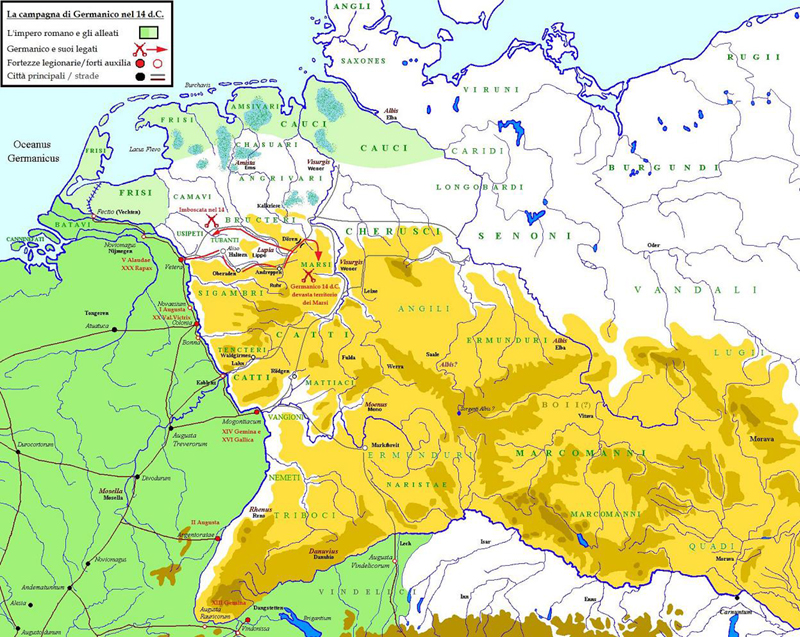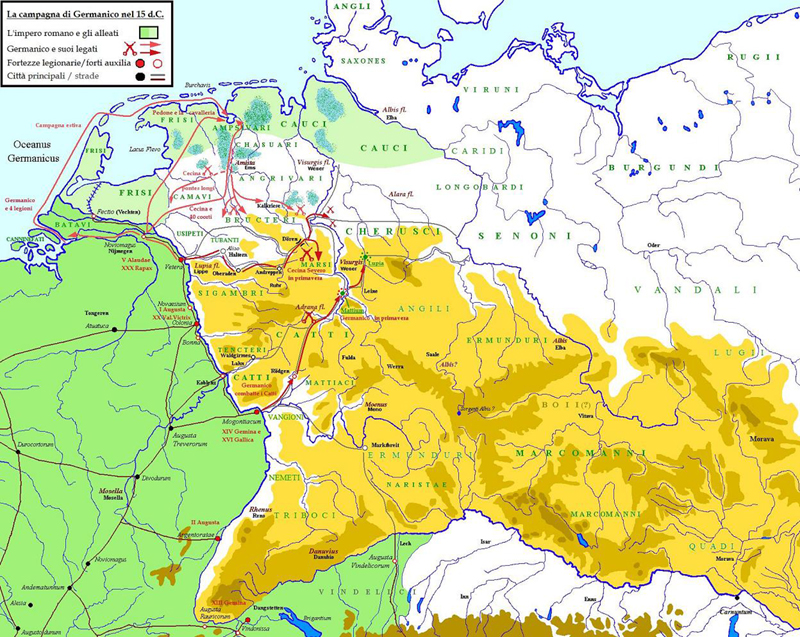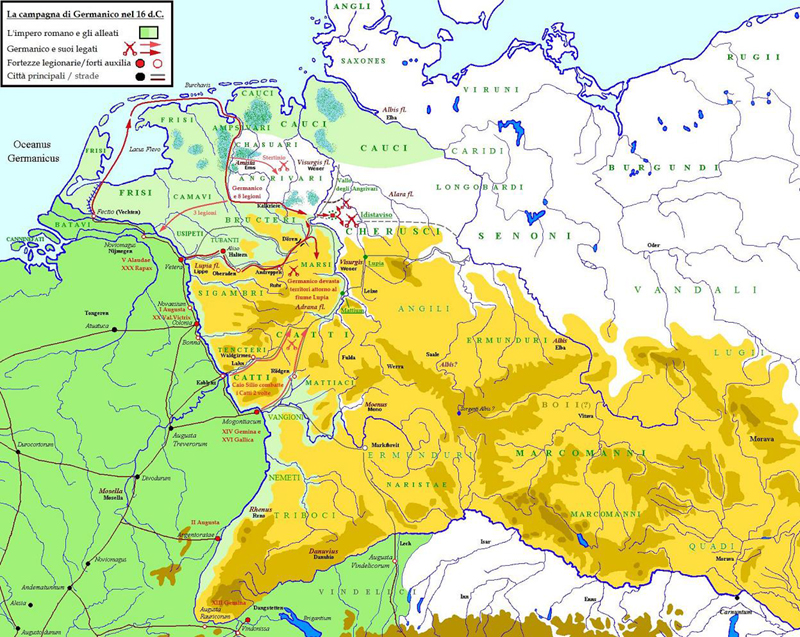The immediate outcome of the battle was the creation of the battlefield sanctuary by the Germanic people; the battle site was visited regularly by
various tribes as a form of memorial. Not lost upon the Germanic people was the
precarious situation they now faced when dealing with Rome: they knew their actions
at Teutoburg Forest would have consequences; however, there was no doubt hope
amongst the tribes that Rome would think twice before trying to incorporate Germania into
the Empire again. It did not take long for nature to begin the decomposition of the battle dead. The well worn path that once went through the area likely grew up in
weeds and wildflowers given the high fertilizer content that had been deposited into the soil due to the decomposition of the bodies and large amount of blood that
was spilled upon the ground. Standing out in the field of colorful flowers would have been the tens of thousands of bones bleached by the sun.
When the news of the ambush reached Rome, the city was
preparing to celebrate Tiberius's victory in crushing the rebellions in
Pannonia and Dalmatia. With Senate approval the preparations for a great
celebration were well under way. Shock and fear went through Augustus at the loss of
three legions; all the previous reports over the last decade from the Rhine commanders had said everything was fine and Germania was ready for provincehood.
He had even confidently appointed Varus as commander of the Rhine legions, a man who had proved his command in Syria. Augustus feared Rome would lose the whole of the Rhine
network they had built, the bases, settlements and ports. There was even fear that the Germanic
tribes might even seize Gaul. The memories of previous invasions by Germanic
people, by the Teutons and the Cimbri, fanned the fears fear that now sprang up
of these Germanic tribes that had defeated Rome. And perhaps that was the
biggest achievement in terms of effect on the Roman Empire: they instilled fear into a
people who had believed they were invincible and
unstoppable.
Fearful of uprisings in Rome, Augustus ordered the army to post guards in the city to discourage any
sympathetic uprising by the foreign residents.
Augustus was so fearful that he dismissed the Germanic cavalry guard, which was a unit with soldiers from tribes who were allied with Rome.
Even though the men showed no signs
of disloyalty, Augustus feared they might join in any uprisings in Rome or join an invading army from Germania. To help quell any uprisings in the provinces, Augustus
granted the governors more power, thus hoping to avert another similar episode like Germania. Augustus was so overcome with fear of a possible invasion
from Germania that he pledged to hold games to honor his god Jupiter as soon as matters were under control again. The same gesture of holding games in honor of Jupiter
had been made following the defeat of the Cimbri and Teutons in 101 BCE. Augustus's mental state
deteriorated with the stress he felt from Germania: he let his hair and beard
grow for months without trimming them, and frequently he would shout out cursing Varus and demanding Varus return his legions.
Augustus would mark the future
anniversaries of the battle in mourning.
To shore up the Rhine border, Augustus sent Tiberius to command what remained of the Rhine army.
Under authority of Augustus, Tiberius redistributed
the Roman army along the Rhine frontier and greatly increased the fortifications of Roman bases along the Rhine. To prepare for an invasion and re-pacification of Germania,
Tiberius supposedly also cut military roads and razed the countryside deep inside Germania.
However, the accounts of Tiberius's expeditions into Germania come from a single source, Velleius Paterculus,
who was enthralled with Tiberius and as such often exaggerated his accomplishments;
no archaeological evidence have been found that supports any of Paterculus's claims: no roads and no razing linked to
Tiberius has been found. Tiberius conducted several campaigns across the Rhine in 11
CE against
the Bructeri and Marsi as part of their punishment for participating in the Battle of Teutoburg Forest. The real objective of these campaigns,
however, was more likely to show the Germanic tribes that Rome still controlled the lands west of the Rhine and the Roman army could move easily and freely to the east whenever it wanted.
In 13 CE Tiberius was granted powers equal to Augustus, and in 14 CE Augustus died and Tiberius became
emperor of Rome.
On his death bed, Augustus had several statements recorded to be read in the Senate on his death. In his statements regarding Germania were his
perceived accomplishments: he asserted he oversaw the conquest of all lands to the mouth of the Elbe,
however, he neglected to mention Varus and his defeat.
Tacitus and Cassius Dio both claim Augustus ordered the Empire not be extended any further east past the Rhine after his death. There is some debate on whose idea this
really was, for Tiberius felt the costs involved in conquering and administering new territories
ever further from Rome and against ever more aggressive enemies
outweighed any possible benefit. Due to this belief Tiberius is believed by many scholars to be the
emperor to have ordered no more expansion and not Augustus. It may be a
case where Tiberius felt it was easier to explain this belief by informing the Senate that Augustus
had wished for the empire not to expand further.
Before his death, in 13 CE, Augustus sent the son of Drusus, named Germanicus, to take control of the Rhine legions. At this point Tiberius returned to Rome to
aid the failing Augustus in the administration of the empire. Now there were eight legions based along the Rhine frontier. Four were
stationed along the lower Rhine:
the 5th and 11th Legions were based at Xanten and the 1st and 20th Legions were based at Cologne.
The remaining legions, the 2nd, 12th, 14th, and 26th, were deployed in
upper Germany. Thus now 1/3 of Rome's military force was based along the Rhine frontier.
Between 14
CE and 16 CE Germanicus led several expeditions across the Rhine. One of
these expeditions led to the discovery of the battle site at Teutoburg Forest,
where the Romans were outraged upon finding their dead lying exposed to the elements. Germanicus ordered his men to give burial to the remains of their countrymen, destroying the sacred site of the Germanic tribes.
Because there were so many of the dead many
were placed in mass graves with weapons placed with the remains. Germanicus was
there to avenge the defeat of Rome and not to bury the dead; with a small
portion of the dead buried, he ordered his men to form up and marched them in
search of the Germanic tribes. Yet, despite Germanicus's efforts, the Germanic tribes
rebuilt the sanctuary, tearing down the mounds his men had just made and once
again scattering the bones and weapons upon the battlefield. By this action the
site again became a sanctuary to the Germanic people. During other campaigns Germanicus openly engaged Arminius and the Germanic allies
in combat to avenge Varus and the three legions, whose bones he had found
scattered. Despite the engagements, the frontier remained unchanged after the
changes made in 9 CE as a result
of the Battle of Teutoburg Forest.

Germanicus's campaign in 14 CE
Map created by Cristiano64, Wikimedia Commons

Germanicus's campaign in 15 CE
Map created by Cristiano64, Wikimedia Commons

Germanicus's campaign in 16 CE
Map created by Cristiano64, Wikimedia Commons
Segestes, who had betrayed Arminius, had been held prisoner since
9 CE. In 15 CE, he managed to get word to Germanicus asking for help. Germanicus
came to the aid of Segestes, releasing him from his prison and seizing Arminius's wife and Segestes' daughter Thusnelda who
was pregnant, Thusnelda was brought to Rome and kept in Roman captivity. In the
same year there were two major battles between Arminius and his allies and Germanicus; neither battle gave a decisive outcome. During the summer of 15 CE, Germanicus led a multipronged assault against the Cherusci and Bructeri, with troops approaching from the Rhineland bases towards the east and with more
troops with the Rhineland navy sailing up the Ems River from the North Sea. In a
location similar to that at Kalkriese, Germanicus found himself with his troops on a narrow
causeway in a boggy lowland around the Ems. Arminius attacked Germanicus, resulting in
a two-day-long battle.
But this time there was no repeat of events like those at
Teutoburg Forest: there was no decisive victory from the 2-day battle as both sides were equally matched.
The final engagement between Rome and Arminius came in 16 CE. With eight legions plus auxiliary units, Germanicus led the Roman army overland to the
Ems river from the Rhine. The battle occurred on a plain that Tacitus referred to as Idistaviso, located near the Weser River. The site has not yet been found by
archaeologists.
Tacitus says Arminius's brother Flavus sided with Germanicus and records the shouting match that went on between the two brothers:
Flavus insisted on "Roman greatness, the power of the [emperor] ... the mercy always waiting for him who submitted himself ...
"His brother [Arminius] urged "the sacred call of their country; their ancestral liberty; the gods of their German hearths; and their mother, who prayed,
with himself, that he would not choose the title of renegade and traitor to his kindred ... to the whole of his race in fact, before that of their liberator."
Flavus became so enraged that he prepared to collect his weapons and mount his horse to cross the river to fight his brother. But the Roman general Stertinius stopped
him. Arminius all the while taunted Flavus from the other bank, partly in their native tongue and "much in Latin, as he had seen service in the Roman camp as a captain
of native auxiliaries."
Tacitus records the battle of the Weser as a victory for Rome: as he puts it the Germanic
warriors were slaughtered from the fifth hour of daylight until nightfall.
A short time after this battle the two sides met again, this time slightly downstream from the previous battle site at a place called Angrivarii wall. Tacitus again
claims this as a Roman victory; however, the battle was indecisive, neither side clearly obtaining a victory. After this battle Germanicus sent several of the Legions back
to the Rhine by ship. But When the ships reached the North Sea a storm came upon them, wrecking many of the ships
and resulting in a great loss of men, equipment and
horses to Rome. Despite Tacitus's grand claims of outstanding victories by Germanicus in 15
CE and 16 CE, it is odd that Tiberius should have given up his campaign before
achieving
complete victory against the Germanic tribes. In 17 CE, Tiberius recalled
Germanicus to Rome,
and many scholars believe it was for that reason that Tacitus embellished his accounts of
Germanicus's campaigns in 15 CE and 16 CE and that the great victories never
occurred but rather the battles were indecisive. Tiberius gave up on ever taming the Germanic
tribes
and looked east, where new threats were popping up and where there was far more wealth to be gained. With the withdrawal of Rome from east of the Rhine in 17
CE, the Roman border between the Empire and Germania officially became the Rhine
River as it had been established by Julius Caesar and reinforced by the Battle of Teutoburg Forest. As
a result Rome was forced to recognize Germania and use diplomacy instead of military force in
negotiations.
Arminius gained status from his role in the Battle of Teutoburg Forest. For many years he continued to work towards more unification of the
Germanic tribes. The Cherusci gained in reputation for standing against Rome; this brought newer tribes like the Semnoni and Langobardi into the confederation of
Germanic tribes. Both of these tribes had previously been allied to King Maroboduus. The switching of
allegiance by the Semnoni and Lagobardi only added to the rivalry
that existed between Arminius and Maroboduus. Rivilry soon turned to war; in 17
CE the two factions collided. The battle did not establish a clear victor, but Arminius
did acquire more power after the battle. The more powerful Arminius became, the more trouble brewed within the
factions of the Cherusci; many of Arminius's rivals
accused Arminius as wanting to be king. The result of the internal conflict saw
some of Arminius's Cherusci allies, including his uncle Inguiomerus, join
with Maroboduus.
Maroboduus lost his kingdom in 19 CE to a nobleman named Catualda,
whom he had previously exiled. When Catualda returned he defeated Maroboduus,
who fled for his life to Rome where he was detained by Tiberius in Ravenna, a city in northern Italy, until his death in 31
CE. The same city was also where the Romans held Thusnelda, Arminius's wife, who gave birth
in captivity to a son named Thumelicus; both she and her son were displayed on May 26, 17
CE as prizes won by Germanicus during
his campaigns. Thumelicus received training as a gladiator in Ravenna; it is believed he died at the age of 15 or 16. There is no further information on Thusnelda; it is
likely she was executed shortly after the parade in Rome in 17 CE.
In 19 CE Tacitus wrote that the Roman Senate was approached by a Chatti
chieftain who offered to poison Arminius. The Senate of course responded that
was not how Rome dealt with treason or took vengeance upon its enemies. The Senate did not have
to wait long: in 21 CE Arminius was killed by members of the Cherusci.
According to Tacitus, Arminius was:
Undoubtedly the liberator of Germany; a man who, not in its infancy as captains and kings before him, but in high noon of its
sovereignty, threw down the challenge to the Roman nation, in battle with ambiguous results, in war without defeat ... he ...
receives less than his due
from us of Rome ...
Before Arminius's death in 21 CE he had seen the immediate results from his unification of some Germanic tribes to fight the Roman Empire
at Kalkriese in 9 CE; with the Roman defeat in 9 CE the bases east of the Rhine such as the ones on the Lippe at Haltern and Oberaden were abandoned and
never reoccupied. There were small forts built by Germanicus beyond the Lippe
but these forts were temporary in nature, used during the summer campaigns. The large
civic center located at Lahnau-Waldgirmes in the Taunus with its associated military base at Dorlar were
abandoned in 9 CE, never to be used again. In the remaining four
centuries of the Western Roman Empire, never would there be another attempt to establish a Roman
presence in the lands east of the Rhine. The trade interactions that occurred
at bases such as Haltern, Oberaden, Waldgirmes, Dorlar and other Roman establishments ended in 9
CE, having an effect on the local economies of the tribes; however,
trade along the Rhine frontier increased, allowing a different form of interaction between the Germanic
tribes and Romans.
No settlements were ever built on the site of the Battle of
Teutoburg Forest and cattle and other livestock were not permitted to graze upon it. Those in the Germanic tribes who had
lost kin in the battle returned to the site as a remembrance of the fallen, in addition to those
who visited to honor the achievement of the Germanic
warriors. As a result of the battle, the Roman boundary never went past the lower Rhine. Military campaigns under Augustus ended against Germania. Instead of Roman citizens Germanic
auxiliaries now occupied the Rhine bases; there was even a period of great trade between Germania and
the Roman frontier in food, iron tools, leather, textiles and an
assortment of other goods. The visits to the battle site declined as survivors of the battle and their kin passed on and new generations took their
place; however,
the battle remained in the stories of the tribes for centuries. As time went on the location of the battle site became lost,
also when it occurred and who was involved; the one
surviving memory was the great defeat the Roman Empire suffered at the hands of the Germanic
people.
